

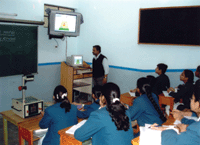 In keeping pace with the latest trends, Rukmini Devi Public School in Delhi, India has been steadily adopting and implementing the latest technological developments not only for the betterment of its students, but also for enhancing the teaching process. As a learning resource, ICT is used for accessing contextual and referential information beyond the textbook and library, through the Internet and Intranet. Students acquire wide and in-depth conceptual understanding through audiovisual presentations on a regular basis. To further enhance skills to comprehend, analyse and interpret the information gathered, students are allotted IT projects for which they actively construct knowledge by exploring information through various ICTs, interacting with simulation and finally presenting their projects for evaluation. Similarly group project work promotes collaborative learning amongst school students and their contemporaries across global boundaries and caters to an understanding of complex issues belonging to different realms.
In keeping pace with the latest trends, Rukmini Devi Public School in Delhi, India has been steadily adopting and implementing the latest technological developments not only for the betterment of its students, but also for enhancing the teaching process. As a learning resource, ICT is used for accessing contextual and referential information beyond the textbook and library, through the Internet and Intranet. Students acquire wide and in-depth conceptual understanding through audiovisual presentations on a regular basis. To further enhance skills to comprehend, analyse and interpret the information gathered, students are allotted IT projects for which they actively construct knowledge by exploring information through various ICTs, interacting with simulation and finally presenting their projects for evaluation. Similarly group project work promotes collaborative learning amongst school students and their contemporaries across global boundaries and caters to an understanding of complex issues belonging to different realms.
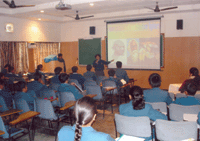 Learning being an eternal process, ICT has opened up several avenues to enrich and update teaching competence of the school faculty. They are able to train themselves in new pedagogical practices and are motivated to share perspectives through video conferencing, websites and other ICT inspired vistas. The school marked its imprint in 1998 on the Internet through its interactive website 'www.rdpschool.com'. It developed further adding up new sections and now has features to support a virtual school. At a micro level teachers are able to structure effective lesson plans after browsing through model teaching resources available on websites which brings a novelty to their teaching and takes them closer to their objectives.
Learning being an eternal process, ICT has opened up several avenues to enrich and update teaching competence of the school faculty. They are able to train themselves in new pedagogical practices and are motivated to share perspectives through video conferencing, websites and other ICT inspired vistas. The school marked its imprint in 1998 on the Internet through its interactive website 'www.rdpschool.com'. It developed further adding up new sections and now has features to support a virtual school. At a micro level teachers are able to structure effective lesson plans after browsing through model teaching resources available on websites which brings a novelty to their teaching and takes them closer to their objectives.
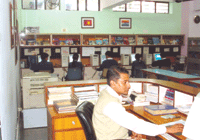 Besides this, ICT is also being used in the school for ensuring efficiency and accuracy at all levels of administrative work. Statistical data is collected and managed with more precision for planning purposes in various departments like examination, accounts and the library which aids in monitoring results, assessing needs, allocating resources, etc in optimum time with no error.
Besides this, ICT is also being used in the school for ensuring efficiency and accuracy at all levels of administrative work. Statistical data is collected and managed with more precision for planning purposes in various departments like examination, accounts and the library which aids in monitoring results, assessing needs, allocating resources, etc in optimum time with no error.
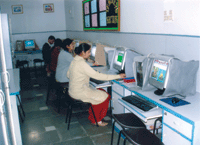 Basic ICT skills are developed among the Rukminians from a young age itself by giving them initial training through multimedia and audio-visual labs. The skills are further polished in senior classes, where they are given knowledge of networking, progra-mming, latest application software and operating systems essential to them under expert guidance.
Basic ICT skills are developed among the Rukminians from a young age itself by giving them initial training through multimedia and audio-visual labs. The skills are further polished in senior classes, where they are given knowledge of networking, progra-mming, latest application software and operating systems essential to them under expert guidance.
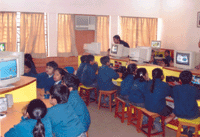 The school has a history of conducting several successful Multi cultural education programmes for enhancing children's understanding and appreciation for the world and its people. These exchange programmes, collaborative projects and other such activities are the efforts of the school to promote internationalism in school curriculum, which are facilitated by various ICT tools like e-mails, videoconferencing etc. In year 2006, British Council, India has recognised the incorporation of the international dimension in RDPS curriculum, by accrediting it with the 'International School Award'.
The school has a history of conducting several successful Multi cultural education programmes for enhancing children's understanding and appreciation for the world and its people. These exchange programmes, collaborative projects and other such activities are the efforts of the school to promote internationalism in school curriculum, which are facilitated by various ICT tools like e-mails, videoconferencing etc. In year 2006, British Council, India has recognised the incorporation of the international dimension in RDPS curriculum, by accrediting it with the 'International School Award'.
The school is poised to revolutionalise the face of education through ICT. Its steady but assured progress has enabled the Rukminians to compete with the rest of the world on equal terms by blending the power of technology with their cognitive power.

The Innovative Teachers Network Connecting Educators
The Innovative Teachers Network (http://apac.innovativete achers.com/default.aspx) connects a global community of educators who share a common interest in enhancing teaching and learning through the use of technology. ITN for Asia Pacific is part of Microsoft's initiative to build and support a global network of teachers and educators in discussing and sharing resources with each other. This site is developed for teachers who are both experienced in the use of ICT in their learning and teaching as well as teachers who would like to find out more about using ICT in their classroom.
 The ITN Asia Pacific hopes to work with educators within the region as well as outside of the region to provide interesting content and information that will be used by teachers and schools. Registration is free and open to all in order to be part of the network.
The ITN Asia Pacific hopes to work with educators within the region as well as outside of the region to provide interesting content and information that will be used by teachers and schools. Registration is free and open to all in order to be part of the network.
The network offers services like creating communities, which allows registered educators to create either open or restricted virtual communities online. The creators of these communities are then able to invite other educators to participate in specific projects or programmes that they are initiating.
Educators can create their discussions and see what their peers think of the various issues regarding education. This is a great tool to seek support from others who might have more experience.Resources are typically contributed by educators and their partners on the network and Microsoft. Teachers would be able to make use of these resources to make classes more interesting!
The professional learning section of the ITN is the place where Microsoft and partners post articles, white papers and other interesting research papers relating to teacher training, professional development, research in education and other interesting papers that are of interest to educators.
Technology in the classroom has the power to transform the way you teach, and the way students learn. It can extend the walls of the classroom to the four corners of the globe. The Innovative Teachers Network delivers professional learning resources that engages the educators intellectually, to help meet today's teaching challenges, and encourage them to become an active stakeholder in the teaching profession.
Info-centre
Digital Learning Power School Award 2007
Do you know a bright and prospering school having the power of innovation technology and brilliance that take the teachers, students, parents, administrators and others in the community to the level of excellence?
If you do, take a moment to nominate this school for the Digital Learning Power School Award 2007.
Nominations
due by
30 May, 2007
Learning Curves
New ICT service for primary schools cuts costs and boosts access
SchoolTerm is not only a cost effective ICT system in British education, but it also helps schools save money. It saves teaching time, allows teachers and pupils to access their work from home and outlaws the annoying wait for a technician to arrive to sort out problems as they are resolved remotely.
Designed by Gloucestershire based company School-Tech (www.school-tech.co.uk) after two of its directors looked into the provision of ICT at their local schools, it is an innovative system based on a simple per user per month pricing model. It gives schools the latest desktops, software and servers, allowing them to run the latest educational applications and cut admin costs without busting their budget.
One of the major ways of cutting costs is by using School-Tech's datacentre. Although schools share the datacentre and its resources each school has its own separate application environment and data. This means faster access time, no more cranking up the computers first thing in the morning, and less downtime. The technology works within the curriculum, in particular in developing personalised learning spaces and even allows pupils and teachers to log on from home. It also makes report writing and lesson preparation easier.
In some schools the most important thing is being first in the technology race. First fibered district. First laptop school. First laptop state. First handheld school. First virtual school. First digital school. First paperless, bookless, unlibraried school. In the rush to be first to use a particular tool, sensible planning tends to be an after thought. “Ready, shoot, aim!”
Intel to introduce low-end 'Classmate' PCs in India
 Leading processor maker Intel will soon introduce 'Classmate', a portable computer for children priced between INR 9,000-11,000, in India under its World Ahead programme, aimed at adding a billion new global computer users.
Leading processor maker Intel will soon introduce 'Classmate', a portable computer for children priced between INR 9,000-11,000, in India under its World Ahead programme, aimed at adding a billion new global computer users.
Two pilot projects with Classmate have been undertaken at Delhi Public School, Delhi and Navodaya Vidyalaya Samiti (NVS), Faridabad near Delhi, India. Intel donated 60 PCs to Class VII students of these schools along with three laptops for teachers for the pilot project. The schools have been provided wi-fi connectivity to enable learning outside classroom.
Classmate has 512 MB RAM and 2GB storage and operates on Windows XP, targeting an age group of 12-15 years. It will also have three security features, parental control on Internet usage, monitoring of machine by teacher PCs in the classroom and the kill switch to disable the machine in case of theft. Through Intel Foundation, the company will also run a training programme for teachers.






















